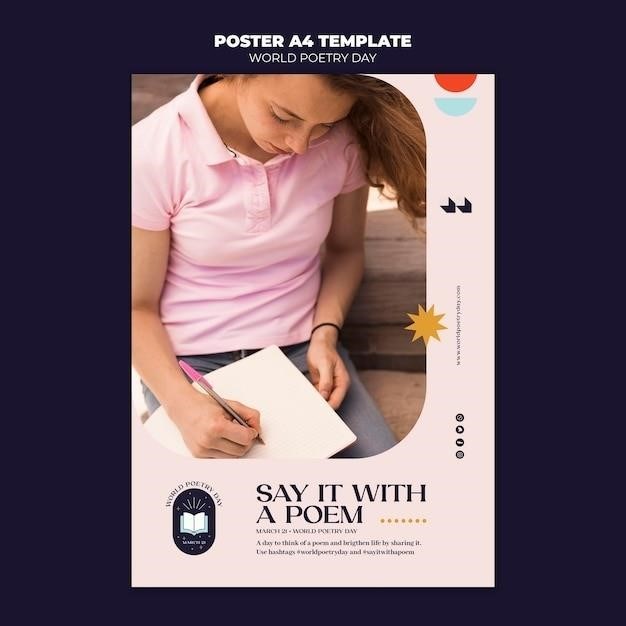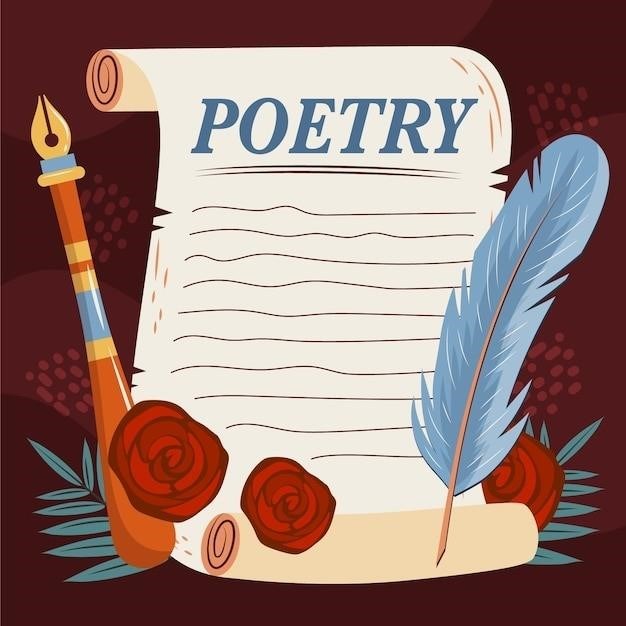The Significance of Poems in PDF Format
The rise of digital platforms has transformed how we access and experience literature. Poems, once confined to physical books or handwritten manuscripts, now have a new home in the digital world – the PDF format. This shift has profound implications for the way we read, share, and preserve poetry.
The Growing Popularity of PDF Poems
The popularity of PDF poems is on the rise, fueled by several factors; The digital age has ushered in a new era of accessibility, allowing readers to discover and engage with poetry in ways previously unimaginable. The ease of sharing and distributing PDFs online has made it possible for poets to reach a wider audience than ever before. Furthermore, the portability and convenience of PDF files allow readers to enjoy poetry on various devices, anytime and anywhere. The flexibility of the PDF format, enabling the inclusion of images, multimedia elements, and interactive features, adds another layer of appeal to the digital poem. This growing popularity is a testament to the evolving nature of poetry in the digital age, where accessibility, distribution, and engagement take on new meanings;
Accessibility and Distribution
PDFs have revolutionized the accessibility and distribution of poems. The format’s compatibility with various devices and platforms ensures that poems can be accessed by a wider audience, regardless of location or technological constraints. The ease of sharing PDFs online, through email, social media, or dedicated platforms, facilitates the rapid dissemination of poetry, connecting poets with readers worldwide. Furthermore, the ability to store and archive large collections of poems in a compact and readily accessible format empowers libraries, research institutions, and individuals to preserve and share literary heritage. The digital distribution of poems in PDF format fosters a more inclusive and dynamic literary landscape, breaking down geographical barriers and making poetry readily available to anyone with an internet connection.
Preservation and Archiving
The PDF format plays a crucial role in the preservation and archiving of poems, safeguarding literary works for future generations. Unlike physical books, which are susceptible to damage, deterioration, and loss, PDFs offer a durable and easily replicable means of preserving poetry. The digital nature of PDFs allows for the creation of multiple copies, ensuring the continued availability of poems even in the face of physical loss. Moreover, PDFs are readily searchable, enabling researchers and scholars to access specific poems or collections with ease. This accessibility contributes to the long-term preservation of literary heritage, ensuring that poems can be studied and appreciated for years to come. The ability to store vast collections of poems in a digitally accessible format empowers libraries, archives, and cultural institutions to maintain and share literary treasures, contributing to the ongoing study and appreciation of poetry;

Advantages of Poems in PDF Format
Poems in PDF format offer a range of advantages for poets, readers, and publishers alike.
Easy Sharing and Collaboration
The portability and ease of sharing that PDFs offer are a game-changer for poets. Imagine a poet sending a draft of their latest work to a fellow writer for feedback, or a teacher sharing a collection of poems with their students. The PDF format makes this seamless. No longer do you need to rely on physical copies or complex file-sharing systems. With a simple click, a poem can be shared instantly, fostering a more collaborative and dynamic literary landscape.
Furthermore, PDFs allow for the easy integration of annotations and comments, making collaboration even more effective. Writers can directly mark up a poem, providing detailed feedback and suggestions. This interactive nature of PDFs encourages open dialogue and constructive criticism, helping poets refine their work and push their creative boundaries.
Enhanced Readability and Formatting
Beyond ease of sharing, PDFs offer poets a level of control over the visual presentation of their work that traditional printed formats often lack. Poems are not merely words on a page; they are carefully crafted structures that rely on spacing, line breaks, and typography to convey their meaning and rhythm. The PDF format allows poets to meticulously control these elements, ensuring their work is rendered exactly as intended.
Imagine a poem with a unique stanza structure, where each line is carefully aligned to create a visual effect. In a PDF, the poet can precisely adjust spacing, font sizes, and line breaks to achieve this desired look. This level of control allows for a more faithful translation of the poet’s vision onto the digital page, preserving the nuances of the poem’s structure and enhancing its overall impact on the reader.
Accessibility for Diverse Readers
The PDF format also enhances accessibility for diverse readers. For individuals with visual impairments, PDFs can be adjusted for screen readers, allowing them to experience the beauty and emotion of poetry through auditory means. Features like font size adjustments, line spacing, and color contrast settings cater to individual preferences and visual needs, making poems more readily accessible to a wider audience.
Furthermore, the portability of PDFs allows readers to access poetry on a variety of devices, from smartphones and tablets to laptops and desktop computers. This flexibility is particularly valuable for individuals who may have difficulty holding or turning physical books, or who prefer to read in different environments. By making poetry accessible to a wider range of individuals, the PDF format fosters a greater appreciation for the art form and promotes inclusivity within the literary world.

Challenges and Considerations
While PDFs offer numerous advantages for poets and readers, it’s crucial to acknowledge the challenges and considerations associated with this format.
Copyright and Intellectual Property
Copyright and intellectual property rights are paramount in the digital age. While PDFs offer a convenient way to share and distribute poems, it’s essential to address the legal implications of copyright and ownership. Poets retain the exclusive rights to their work, including reproduction, distribution, and adaptation. Sharing PDFs of poems without the author’s permission constitutes copyright infringement. It’s crucial to respect the author’s rights and obtain explicit permission before sharing or distributing poems in PDF format. This includes ensuring that any copies of the poem, whether for personal use or distribution, are properly attributed to the original author.
Furthermore, the use of PDFs for poetry opens up a complex debate about the commercial exploitation of literary works. While some authors may be comfortable with their poems being shared online, others may prefer to retain control over the distribution of their work. The rise of online platforms and digital publishing has blurred the lines between traditional copyright laws and the digital world. It’s essential for poets to be aware of the potential legal ramifications of sharing their poems in PDF format, ensuring that their work is protected and their rights are respected.
Accessibility for Individuals with Disabilities
The accessibility of poetry in PDF format for individuals with disabilities is a critical concern. While PDFs can offer advantages like customizable font sizes and text-to-speech features, they also present challenges. For individuals with visual impairments, navigating PDFs can be difficult, especially if the document lacks proper formatting, headings, or alternative text descriptions for images. This can limit their ability to fully engage with the poem’s content and structure. Similarly, individuals with cognitive disabilities may find it challenging to process the information presented in a traditional PDF format, requiring alternative formats or assistive technologies.
Potential for Misuse and Piracy
The widespread availability of poems in PDF format raises concerns about potential misuse and piracy. The ease with which PDFs can be copied, distributed, and modified creates opportunities for unauthorized reproduction and distribution. This can undermine the rights of poets and publishers, hindering their ability to monetize their work and receive proper attribution. The proliferation of pirated PDFs can also dilute the value of legitimate publications, impacting the market for poetry books and potentially discouraging emerging poets.
To mitigate these risks, poets and publishers need to implement robust copyright protection measures. This may involve using digital rights management (DRM) technologies to restrict copying and distribution, watermarking PDFs to identify the source, and actively monitoring online platforms for unauthorized copies. Furthermore, raising awareness about copyright issues and educating readers about the importance of respecting intellectual property rights are crucial steps in combating piracy. By taking proactive measures, the poetry community can help ensure that poems in PDF format are shared ethically and fairly, preserving the integrity and value of poetic works.
The Future of Poems in PDF Format
The future of poems in PDF format is intertwined with the evolving landscape of digital publishing and the growing influence of emerging technologies.
Emerging Technologies and Innovations
The digital realm is constantly evolving, and these advancements are poised to reshape the landscape of poetry in PDF format. Emerging technologies, such as augmented reality (AR) and virtual reality (VR), offer exciting possibilities for immersive poetic experiences. Imagine reading a poem in a virtual environment that brings the words to life with dynamic visuals, sounds, and even interactive elements. AI-powered tools can analyze poetic language, generate new verse, and even personalize reading experiences based on individual preferences. This could lead to the creation of customized digital poetry collections tailored to specific interests and reading styles. The integration of artificial intelligence (AI) into PDF creation and editing could revolutionize the production and distribution of poetry. AI-powered tools could automate tasks such as formatting, layout, and even the generation of original poems. This could democratize poetry creation, making it more accessible to a wider audience.
The Role of Artificial Intelligence
Artificial intelligence (AI) is poised to play a transformative role in the realm of poetry, particularly in the context of PDF format. AI-powered tools can analyze vast datasets of poetry, identifying patterns, themes, and stylistic elements that inform the creation of new verses. These tools can also generate poems based on specific prompts or themes, offering a new avenue for creative exploration. AI-driven translation services could bridge language barriers, making poetry accessible to a global audience. Imagine a future where AI can translate a poem seamlessly into multiple languages, preserving its nuances and beauty. AI can also enhance the accessibility of poetry for readers with disabilities. AI-powered tools can convert text to speech, allowing visually impaired individuals to enjoy poetry through audio. The integration of AI into PDF creation and editing could revolutionize the production and distribution of poetry. AI-powered tools could automate tasks such as formatting, layout, and even the generation of original poems. This could democratize poetry creation, making it more accessible to a wider audience.
The Impact on the Publishing Industry
The increasing prevalence of poems in PDF format is undoubtedly having a significant impact on the publishing industry. Traditional publishing houses are facing new challenges as digital platforms offer alternative distribution channels for poets. Independent authors and poets can bypass traditional gatekeepers and reach their audience directly through self-publishing platforms, where PDFs play a crucial role. This shift in power dynamics could lead to a more diverse and inclusive literary landscape, as emerging voices gain wider reach. However, the rise of PDF poetry also poses challenges for traditional publishers. The ease of sharing and copying PDFs raises concerns about copyright infringement and piracy, impacting the revenue streams of publishers. Moreover, the shift to digital formats could lead to a decrease in print sales, potentially affecting the profitability of publishing houses. The publishing industry must adapt to these changes, finding new ways to engage readers and monetize their content in the digital age. This could involve embracing new distribution models, investing in digital marketing strategies, and exploring innovative ways to protect intellectual property in the online environment.
